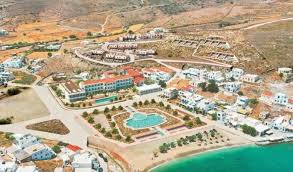How Kythnos is becoming Greece’s smart island

Athens: The Kythnos Smart Island project, funded by Siemens, has been an example of sector coupling in Greece, proving innovation and sustainability are compatible. Credit: Clean Energy of the EU Islands / European Commission – CC BY 4.0
The German multinational technology conglomerate, Siemens, funded the Kythnos Smart Island project, which has now been completed. The project is proof that smart energy technologies can be a part of holistic infrastructure upgrades.
The four-year project on Kythnos, located between Kea and Serifos, around 60 miles (97 km) from the port of Piraeus, aimed to test the ground for a wide range of innovative and holistic technologies.
The project’s core was undoubtedly Siemens’s clean and smart energy technologies. However, the conglomerate also attempted to address water, waste, and transport issues on the island of Kythnos.
The Kythnos Smart Island project focused on energy interventions
The Kythnos Smart Island project renewed and upgraded an off-grid microgrid energy system at Gaidouromantra in the southern part of the island. To do so, the conglomerate installed smart meters, batteries, and demand response systems in buildings.
The key focus was smart meters, given that they are advanced electricity meters that provide real-time data on energy consumption. Such meters help monitor and manage energy usage.
Grecian Delight supports Greece
Municipal buildings were also upgraded thanks to the Kythnos Smart Island project. Heat pumps and photovoltaic solar panels were installed on the island.
The Smart Island project also included the installation of both a private and public electric vehicle charging network on Kythnos. This was done in collaboration with hotels and restaurants on the island.
The collaboration allowed for the implementation of door-to-door recyclable waste collection with the use of light utility electric vehicles. The street and public space lighting network on Kythnos was also redesigned and retrofitted. Moreover, three new distillation plants were established, and the existing water distribution network was upgraded.
With the Kythnos Smart Island project, Siemens developed a prototype center for green waste management. This was a double development, given that the company also upgraded a local marina and helped improve traffic management in three of the main settlements on the island.
Many analysts say the Kythnos Smart Island project proves that applying principles of sustainable development and circular economy is not only possible but can be done successfully.
Experts claim the project has accomplished this by integrating the elements of technological and social innovation that other islands could benefit from.
Plans to implement these systems are already in motion with the Greek government’s “GR-eco islands” initiative. The aim of the initiative is to transform Greek islands into innovation hubs and pioneers of green energy and digital transitions.





